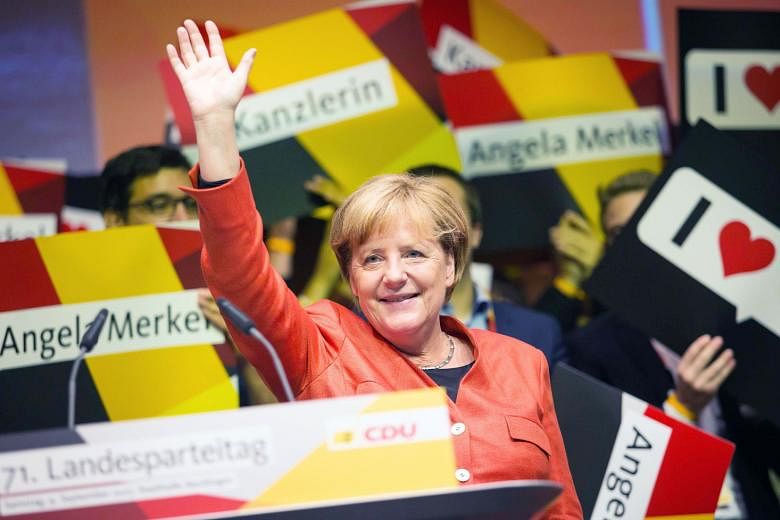Put aside grand visions, soaring rhetoric or deep explanations for the unruly forces of our times. As Dr Angela Merkel tells it, the secret to winning elections is found in the parable of the humble domestic plumber.
The householder with a broken dishwasher, the German Chancellor has been heard to say, does not want long accounts or exhaustive diagrams of the technicalities. What they require is a tradesperson who can be trusted to fix the machine. So in plumbing, so in politics. Voters are uninterested in wonky policy prescriptions or the theory of geopolitics. They want a leader they can be confident will put things right.
There is an abundance of explanations for the angry populism that has upended the old order in many rich democracies - some are economic, some social, some cultural. The common denominator is a collapse of faith in the elites. Mr Donald Trump presented Americans with a wholly false prospectus. Britain's Brexiters lied and then lied again about the European Union. Mr Boris Johnson, the foreign secretary, still cannot help himself. Many supporters, one suspects, were conscious of the mendacity. But had the old guard shown itself any more trustworthy?
Dr Merkel's election campaign has been a lesson in the positive power of trust. The Chancellor has not been shy about promoting her experience as an experienced stateswoman in an ever more dangerous world. Nor about mentioning the buoyant German economy. You have never had it so good, Harold Macmillan told British voters more than half a century ago. "Live well and happily," echoes Dr Merkel. Trust me.
By and large, Germans are living well. They have their problems - for some reason the best engineers in the world cannot build simple things like airports - but thus far society has been spared the great cleavages, economic and social, that are fracturing other democracies. And yet Germans cannot forever escape the consequences of disorder elsewhere.
Mr Trump has kicked away an essential pillar of German security. His disdain for liberal values and rejection of the post-war Western order defies Berlin's attachment to a system of international relations grounded in rules rather than brute power. The US President's every appearance on television screens is another reason to back Dr Merkel.
In 2015, she came close to losing the people's trust. Her decision to open the borders to refugees fleeing the war in Syria marked a rare occasion when the Chancellor elevated personal conviction over studied pragmatism. It nearly all went wrong. A majority of Germans voice pride in her defence of the liberal values that have been embedded deep in the nation's post-war psyche. They also feared they would be overwhelmed.

Two years on, the migrant tide has been reduced to a smallish stream and the nation's bureaucracy has re-established its grip. Everywhere you go, you find politicians, officials and leaders of civil society bustling to promote integration of the incomers.
Dr Merkel insists she has nothing to apologise for. She is right. Closing the borders would have shamed Germany and invited a humanitarian catastrophe in the Balkans. Yet it was the same Dr Merkel who then struck a tawdry deal with Turkish President Recep Tayyip Erdogan. Berlin agreed to pay Mr Erdogan to lock up the refugees in Turkey - an arrangement that has so far survived a myriad of separate disputes between the two countries. The moral here perhaps is that leaders can be idealists on Mondays as long as they promise to be realists on Tuesdays.
Not everyone is sanguine about integrating the hundreds of thousands - perhaps one million - refugees who arrived before Turkey closed the gates. Alternative for Germany, a party of the xenophobic far right, looks like doubling its support to 10 per cent. In parts of the former East Germany, the figure is likely to be much higher. Elsewhere, a tenth of the electorate seems a smallish number. For Germans still living with the demons of Nazism, the presence in the federal Parliament of a party preaching ugly nativism will be a shock.
The big question that has gone unanswered during the campaign is what Dr Merkel intends to do with her victory. Her fourth term must surely be her last. Her thoughts must turn to legacy? And yet those who have worked with her confirm that she is fixed in her preference for plumbing over vision. Caution has served her well. Her conservative predecessor and one-time mentor, Dr Helmut Kohl, would have been gripped by the opportunity to take another leap towards European unity. Dr Merkel recognises the importance of Europe to Germany's national interest, but her approach is instrumental.
Perhaps the Chancellor is the definition of Germany's problem. It is a country that has learnt from its history the worth of civility, reason and law. It lives by rules; decent rules. It has prospered greatly as a consequence. But all the while it struggles to understand why it need be any more than a passive beneficiary of what, pre-Trump, was called the Pax Americana. Fixing the dishwasher is not much use if the kitchen roof is about to fall in.
On the other hand, we should not be too tough on Dr Merkel. To say that Germany has a problem is really only to highlight how bad things have become elsewhere.
FINANCIAL TIMES

